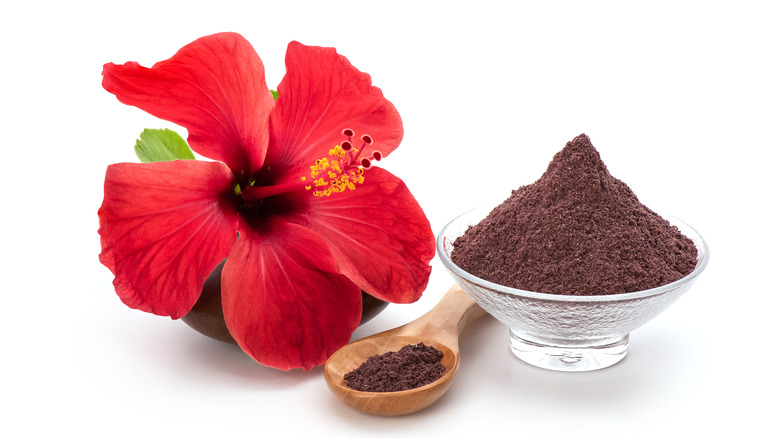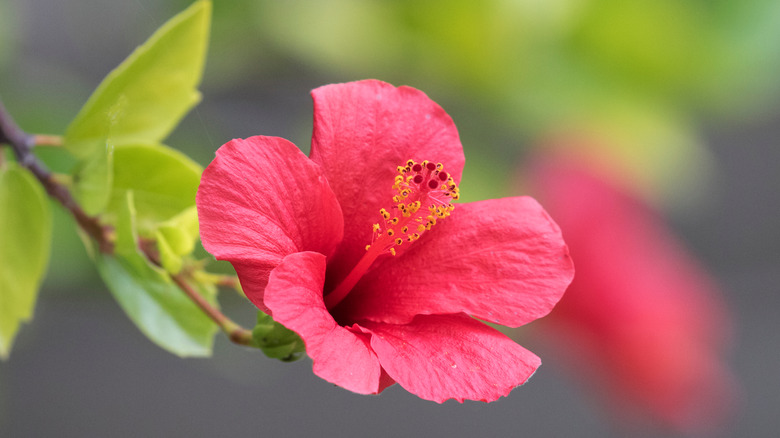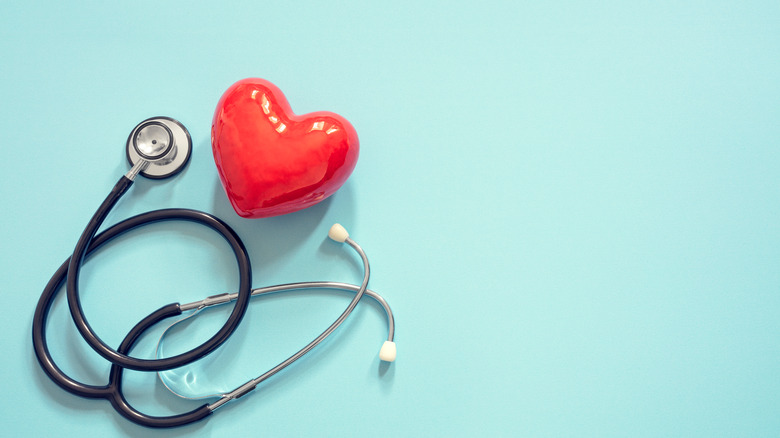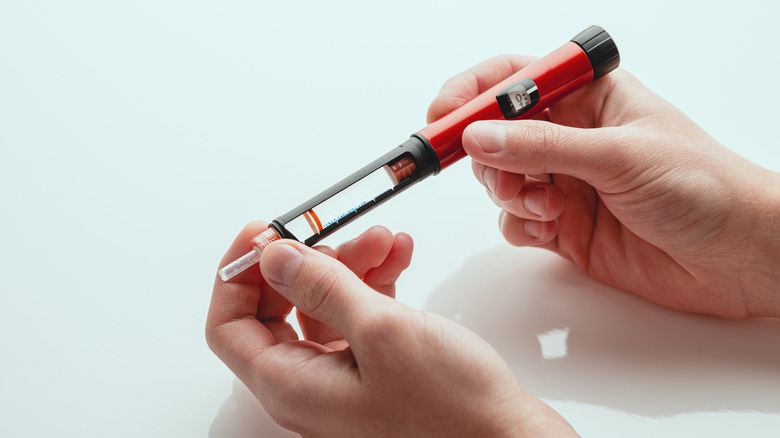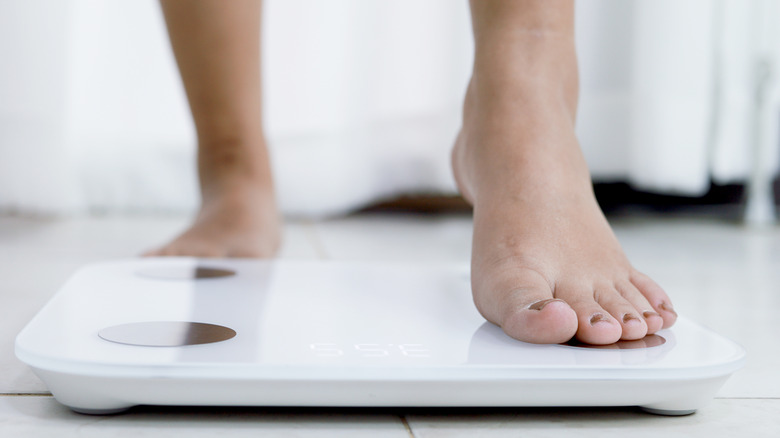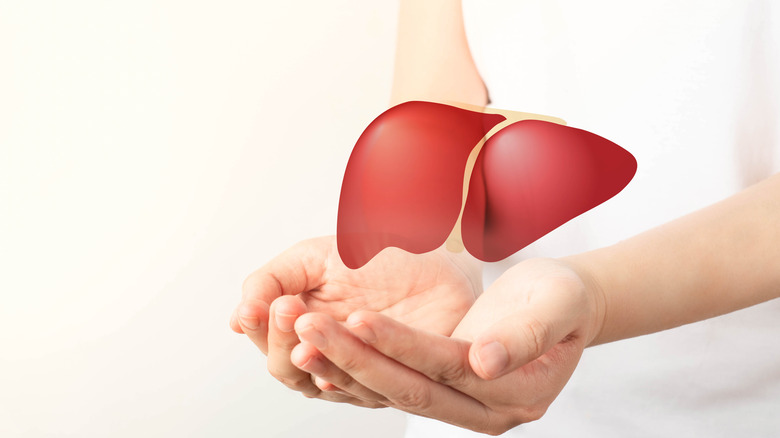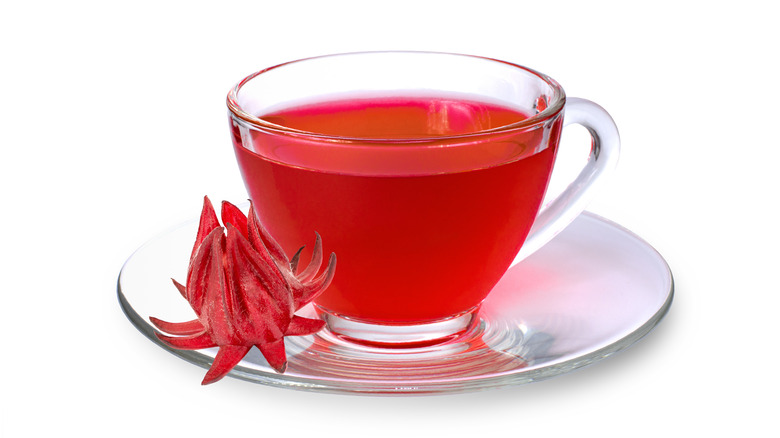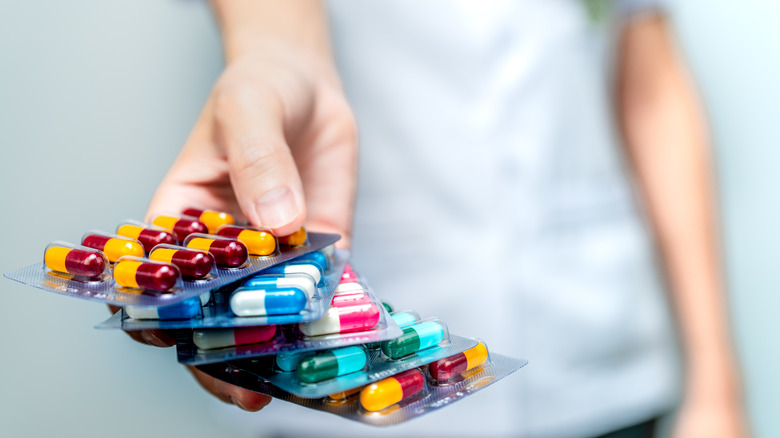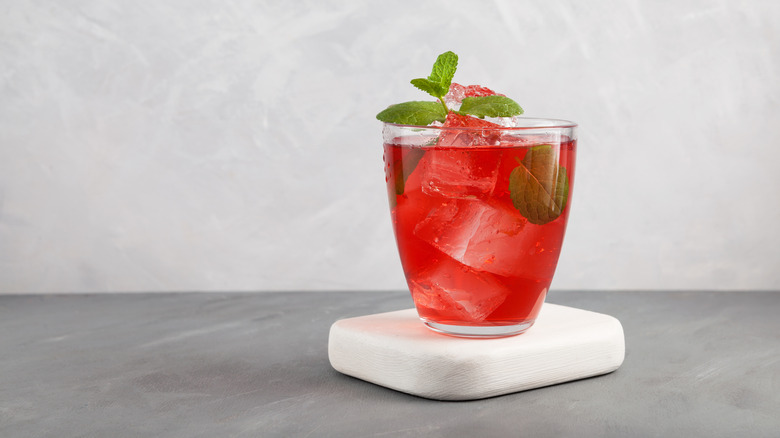What Happens To Your Body When You Consume Hibiscus Tea Every Day
Hibiscus tea: While perusing the various tea options at your local coffee shop, you may have come across this pretty pink option. Further, if you have ever ordered hibiscus tea, you know that it is one you likely won't confuse with other teas, not only due to its ruby red color, but also because of its tart, slightly sour flavor. This vibrant beverage is derived from the beautiful hibiscus flower; a tropical bloom that would remind anyone of paradise. While there are many varieties of the hibiscus flower, not all are ideal for making tea — hibiscus tea is most commonly made from H. sabdariffa, which has white and pale pink petals and a dark red center (via Food Chemistry).
Hibiscus tea has been loved for centuries in different areas of the world for a variety of purposes and benefits. According to Drugs.com, hibiscus is largely produced in Mexico or Jamaica, but the flower is actually native to tropical Africa, where it has been used for a long time and consumed in different forms — some cultures have even consumed the entire plant, including the leaves. Hibiscus tea has been used for functional purposes, such as in fragrances and to create useful tools like rope. Additionally, hibiscus tea has been used in health and medicinal applications, including in skincare, and in the treatment of constipation, cardiac conditions, nerve diseases, and hypertension.
Hibiscus tea may help fight oxidative stress
One of the major benefits of hibiscus tea is its potential to help with oxidative stress, per the Cleveland Clinic. Oxidative stress can occur as a result of the production of free radicals in the body, which can lead to a host of problems including, but not limited to, cancer and diabetes. It is for this reason that antioxidants are so important to fight these dangerous free radicals. We can get antioxidants from within our bodies, but they can also come from the foods and drinks we consume. To help your body be the most prepared to fight free radicals, it is critical that our diet is rich in antioxidant-packed sustenance, one of which is hibiscus tea.
Of the antioxidants that can be found in hibiscus tea, one of the more studied examples is called anthocyanin. According to a 2011 study published in Drug and Chemical Toxicology, hibiscus-derived anthocyanin extract was observed for its ability to effectively fight free radicals and oxidative stress in the livers of rats. After inducing oxidative damage in the rat liver cells, the anthocyanin extract was shown to combat the decrease in antioxidative enzymes. However, it is important to note that further research will be necessary to confirm a similar effect in humans.
Hibiscus tea may help combat bacteria
According to the Cleveland Clinic, some studies have shown that hibiscus tea may have antibacterial and antimicrobial properties. A 2014 study from the Journal of Medicinal Plant Research studied the effects of extracts via both water and ethanol from the hibiscus flower on five different types of bacteria: Escherichia coli (can cause illnesses like diarrhea and UTIs, per the Centers for Disease Control and Prevention), Staphylococcus aureus (often causes skin infections, per MedlinePlus), Salmonella typhi (can cause typhoid fever according to the CDC), Shigella dysenteriae (can cause shigellosis, an often-mild condition resulting in diarrhea, fever, and cramps, per the CDC) and Streptococcus mutans (can cause dental caries and plaque, per a 2010 study). Both types of extracts were found to have antibacterial effects against all five bacteria, but it was found that the extracts were most effective on Staphylococcus aureus and escherichia coli. Extracts from ethanol were also found to be the most effective.
That said, while it is exciting to envision a world where hibiscus tea has similar therapeutic effects to prescribed antibiotics, findings surrounding the potential antibiotic effect of hibiscus tea have primarily been from laboratory studies. More research is needed regarding hibiscus tea's effect on bacteria within the human body.
Your cholesterol may improve
There are different types of cholesterol in our body, and a high level of certain types of cholesterol is a common problem in the world and can contribute to many different types of health conditions. In fact, statistics from 2015 to 2018 showed almost 12% of adults in the U.S. age 20 and older had high total cholesterol (over 240 mg/mL), according to the CDC. The cholesterol we consider to be good is the high-density lipoprotein, or HDL cholesterol, and the bad cholesterol is the low-density lipoprotein, or LDL cholesterol. LDL cholesterol has been associated with higher risk of stroke and HDL cholesterol has been shown to help keep levels of bad cholesterol in check, according to the CDC.
Per Healthline, some studies have given us reason to think that hibiscus tea can help lower the amount of LDL cholesterol and raise the amount of HDL cholesterol in the body. An example was one that looked at how hibiscus tea may affect cholesterol in subjects with diabetes compared to black tea (via The Journal of Alternative and Complementary Medicine). Sixty subjects were given either kind of tea twice a day for one month, and those who were given hibiscus tea saw the more favorable results: an increase in HDL cholesterol, decrease in LDL cholesterol, as well as overall cholesterol levels and triglycerides (fat found in the blood). However, not all studies have come to the same conclusion regarding hibiscus' effect on cholesterol, and therefore more research is needed in this area.
It may help lower blood sugar levels
High levels of blood sugar and insulin resistance are common health problems today, sometimes leading to the development of diabetes. According to the National Diabetes Statistics Report 2020 from the CDC, an estimated 10.5% of Americans have diabetes (as of 2018). One important factor in staying healthy is hydration, but unfortunately many beverages for which we reach to quench our thirst, like soda and sports drinks, are laden with sugar that can lead to conditions like insulin resistance, according to a 2016 study in the Journal of Nutrition. For this reason, the more thirst-quenching drink options available to us that are not high in sugar (or better yet, don't contain any), the better off we may be in staving off insulin resistance or diabetes in the future.
Hibiscus tea is not only a flavorful way of increasing our water consumption without raising our sugar, but it can actually potentially help with combating insulin resistance, according to Healthline. A 2014 study found that a particular species of hibiscus known as Hibiscus mutabilis (commonly known as Confederate rose) offered protection to muscle cells and their ability to signal insulin production from the damaging effects of saturated fatty acids (via Biochemical and Biophysical Research Communications). The study found that ferulic acid specifically, derived from Hibiscus mutabilis, was the key factor at play in this effect.
Hibiscus tea can help with exercise recovery
Hibiscus tea can offer benefits to our bodies after exercise. While a very important component of a healthy lifestyle, exercise does cause damage to the muscles, according to Livestrong.com. This mild damage is a normal side effect of exercise, since the muscles are enduring increased resistance. However, especially in the case of professional athletes who regularly engage in intense exercise, it is important that the muscles fully and adequately recover from this damage to prevent injury or muscle rupture. It is also important that the muscles are able to consume the needed amount of oxygen for exercise in order to optimize performance, according to University of California Davis Health.
One 2016 study from the Journal of Dietary Supplements found that hibiscus tea, referred to as "sour tea" by the study, was effective in mitigating muscle damage caused by exercise in soccer athletes. The study looked at this effect of extracts from both green tea and sour tea in over 50 male soccer athletes. After consuming either green or sour tea extract for six weeks, there was a significant decrease in malondialdehyde, a marker in the blood of muscle damage. Recipients of the sour tea extract also showed increased levels of total antioxidant capacity. That said, this study evaluated hibiscus tea extracts, which are more concentrated compared to tea.
It could help with weight loss
Hibiscus naturally does not contain any sugar, so tea made from hibiscus can serve as a refreshing, sugar-free beverage option, according to Livestrong.com. However, some people do prefer to add sweetness to their tea with additions like granulated sugar or honey, which also add in calories. If you are a lover of sweet tea, be cautious and aware of this if you are hoping for weight loss, or consider trying calorie-free sweeteners like stevia.
In addition to naturally not containing sugar, hibiscus tea can also help with weight loss efforts by providing satiety, or a feeling of fullness. When your stomach is full, even if it is with liquid, your brain will recognize this fullness, and this can keep you from reaching for a potentially calorie-rich snack. On top of its nutritional benefits, hibiscus is also just a more flavorful option for increasing your fluid intake if you get tired of plain old water.
It may help improve your liver health
Some studies have suggested that hibiscus tea could potentially help preserve the health of our liver, per Healthline. One of the potential comorbidities that can result from obesity is steatosis, otherwise known as fatty liver disease, which is caused by buildup of excess fat around the liver. This can result from excess fatty acids floating around in the blood. Because our liver is a major player in our immune function, protein and energy production, digestion, and much more (according to the Mayo Clinic), it is very important to keep the liver healthy.
Hibiscus tea was found in one study to help with steatosis, as well as with obesity and the accumulation of fat surrounding the abdomen (via Food & Function). Adult patients with a BMI of 27 or higher were divided into either a control group or an experimental group that received hibiscus sabfariffa extract. After 12 weeks, free fatty acid was observed to be lower in those who received the hibiscus extract versus the control group.
Hibiscus tea can have anti-inflammatory effects
Hibiscus tea can have a beneficial impact on inflammation in the body. According to the Cleveland Clinic, oxidative stress can cause inflammation. Additionally, inflammation can also be caused by other responses or situations, such as when your body is fighting a cold or is recovering from an injury. Inflammation is also associated with a list of different chronic conditions, including Alzheimer's and a variety of cancers.
Hibiscus can potentially help mitigate this inflammatory response (per the Cleveland Clinic). This possible benefit has mostly been observed in animal studies, but a few studies have shown promise that hibiscus may have a similar effect on human bodies. However, given the limitations of our current knowledge about its impact, hibiscus should not be consumed to help with inflammation unless advised by your medical team. As with any condition, your physician or provider can formulate the best treatment plan for your specific disease or case of inflammation.
Hibiscus tea may potentially lower your blood pressure
Chronic elevated blood pressure is a health problem experienced by many Americans today – 47% of all adults in the U.S. to be exact, according to the CDC. High blood pressure can occur over time as a result of a variety of causes, including living a sedentary lifestyle and making other unhealthful lifestyle choices, or from conditions like obesity and diabetes (via the CDC). Regularly consuming foods and beverages high in sodium, often found in processed foods and restaurant foods, can also result in high blood pressure (per the CDC).
The good news is that hibiscus tea could potentially help lower one's blood pressure. One 2019 study from the Journal of Advanced Pharmaceutical Technology and Research evaluated the potentially therapeutic effects of hibiscus tea on blood pressure in individuals diagnosed with stage 1 hypertension (defined by the Mayo Clinic as a systolic blood pressure measurement of 130 to 139 mm Hg or a diastolic measurement of 80 to 89 mm Hg). The study intervention involved giving the experimental group 2 cups of hibiscus tea every morning for one month. Results found the mean reduction in both systolic and diastolic blood pressure was significantly higher in the experimental group versus the control group.
It can potentially have some antidepressant effects
It has been uncovered through research that a chemical class referred to as flavonoids can have antidepressant effects, according to a 2012 study from the Indian Journal of Pharmacology. These chemicals are commonly found in plants, and anthocyanin and quercetin are two flavonoids found in hibiscus tea. The effects of these flavonoids were observed in mice during different behavioral tests, and results pointed to some exciting findings regarding the potential use of hibiscus tea in the mental health space.
In the study, a collection of drugs were given to mice to induce the effects of depression, such as lowering dopamine and serotonin. The experimental group of mice were then given anthocyanins and anthocyanidins from Hibiscus rosa-sinensis in menthol extract and were evaluated during different behavioral tests. Results of the tests indicated an antidepressant effect in the group of mice that received the menthol extract containing anthocyanins and anthocyanidins. However, more research must be done to verify these findings, and to confirm a similar effect in humans.
Hibiscus tea could serve as an immune booster
In order to have a healthy, well-functioning immune system, there are many nutrients that are important. However, it is no secret that the antioxidant vitamin C is one of those essential for a healthy immune system, as discussed in this 2017 study (via Nutrients). As you may have already guessed, hibiscus tea is a great source of vitamin C. According to this 2017 study, the calyxes of the H. sabdariffa flower contains 17 mg of vitamin C, which is about 19% of the recommended dietary allowance (RDA) for men and 23% of the RDA for women, per Harvard T.H. Chan School of Public Health.
According to Well + Good, vitamin C isn't the only antioxidant found in hibiscus that can aid the immune system — polyphenols are also very helpful and effective in setting us up for success against foreign bodies that could make us sick or even cause long-term health conditions. According to WebMD, this powerful nutrient can help with many different diseases and health problems. The beneficial applications currently found for polyphenols include improvements in circulation, reduction in inflammation, and even potentially prevention of tumor growth or the killing of cancer cells.
Known drug interactions with hibiscus tea
Given all the potential benefits that could come from drinking hibiscus tea every day, you might be feeling inspired to go give it a try at your local tea or coffee shop. However, as is the case with anything we ingest, it is important to be aware of potential interactions between hibiscus tea and medications you might be taking to avoid any negative side effects or a reduction in the effectiveness of the medication.
According to MedlinePlus, one should not drink hibiscus tea while taking chloroquine, a medication used to treat or prevent malaria, as hibiscus can inhibit the body from absorbing the chloroquine and make the medicine less effective. There are also some less dangerous potential drug interactions, and caution should still be exercised when taking these medications and consuming hibiscus tea. These include (but are not limited to) medications for diabetes and antihypertensive medication. This is because of the potential of hibiscus tea to reduce blood sugar and blood pressure — this effect, in combination with medication also intended to lower these levels, can drop them too low. One should also be mindful and aware when taking Acetaminophen and medications that are affected by the liver while also regularly consuming hibiscus tea, as the hibiscus could potentially speed up the removal of the acetaminophen from the body.
Precautions for women
While there are numerous potential benefits to regularly sipping on hibiscus tea, there are some special considerations for women. Hibiscus tea has been found to impact adolescent and adult female animals and humans in recent studies, with effects ranging from various health problems to hormonal issues like delayed puberty and changed menstruation. While these findings have mostly been from animal studies, experts do recommend that girls and women avoid hibiscus tea under specific circumstances.
According to a study done in rats in 2008, the consumption of hibiscus in pregnant rats caused both malnutrition and increased post-birth weight gain in the mother rats, as well as a delay in puberty and higher body mass index in their offspring (via Nigerian Journal of Physiological Sciences). This was also found to be the case in another study on rats in 2016 (via Nursing & Care Open Access Journal). Unfortunately though, that is not the end of the potential negative side effects from hibiscus related to women's health. Another study done in 2019 on teenage girls showed that the consumption of the pretty flower actually influenced their menstrual cycle. While this could potentially be beneficial to girls who experience irregular periods, according to Healthline, this could be harmful to pregnant women, even potentially resulting in miscarriage. Therefore, pregnant women are generally advised to avoid drinking hibiscus tea.
Ways of consuming hibiscus
If you find yourself intrigued with this beautiful and potentially helpful flower, there are actually different ways of consuming hibiscus beyond tea. However, if you do enjoy the recognizable pink beverage, you may find it even more fun to grow the hibiscus flower yourself to make the tea fresh (be sure to give it a try at your local coffee shop first though before putting in the work of growing it). If you do want to make hibiscus tea straight from a fresh flower, the base of the flower called the calyx is what is used to make tea, according to MedicalNewsToday.
Besides steeping the dried leaves in hot water, you can also just eat the hibiscus flower as is, according to Healthline. Hibiscus has also been used in various other ways by different cultures, including in both sweet and savory recipes (via Epicurious). While sweet recipes such as jams and syrups are common due to hibiscus's tart flavor (via Today), you can even use the attractive pink flower to add color and interesting flavor to dishes like a quesadilla, like in this recipe from The New York Times.

